Honey bee contract farming is an agreement between a farmer and an agribusiness firm in which the company provides the inputs needed for farming. The farmer agrees to sell the output to the company at a predetermined price. Honey bee contract farming is a type of contract farming where farmers rear bees and produce honey according to companies’ specifications.

This article will provide an overview of honey bee contract farming in India, including current trends, major players, costs and profits, the process of contract formation, and the pros and cons of this system.
Honey Bee contract farming in India
What is contract farming?
Contract farming is an agricultural production system in which farmers grow crops or rear livestock according to an agreement with an agribusiness firm. The firm provides the inputs needed for production and buys the output from the farmer. This arrangement is increasingly common in developing countries, where small-scale farmers often lack the resources and knowledge to produce crops or rear animals effectively.
Under a contract farming arrangement, farmers typically receive training from the agribusiness firm on improving their production techniques. They may also receive loans or other forms of financial support from the company. In return, the farmer agrees to sell the company a particular crop or animal product at a predetermined price.
Contract farming can be a risk for both farmers and agribusinesses. For farmers, there is always the possibility that the company will not honor its commitments or that prices will drop unexpectedly. Agribusinesses may find it difficult to control quality and quantity when working with large numbers of small-scale producers. Nevertheless, contract farming arrangements can offer significant benefits for both parties, including improved incomes for farmers and increased efficiency for companies.
In case you missed it: Shrimp Contract Farming in India: Companies, Agreement, Process, Profits, Benefits, and Risks
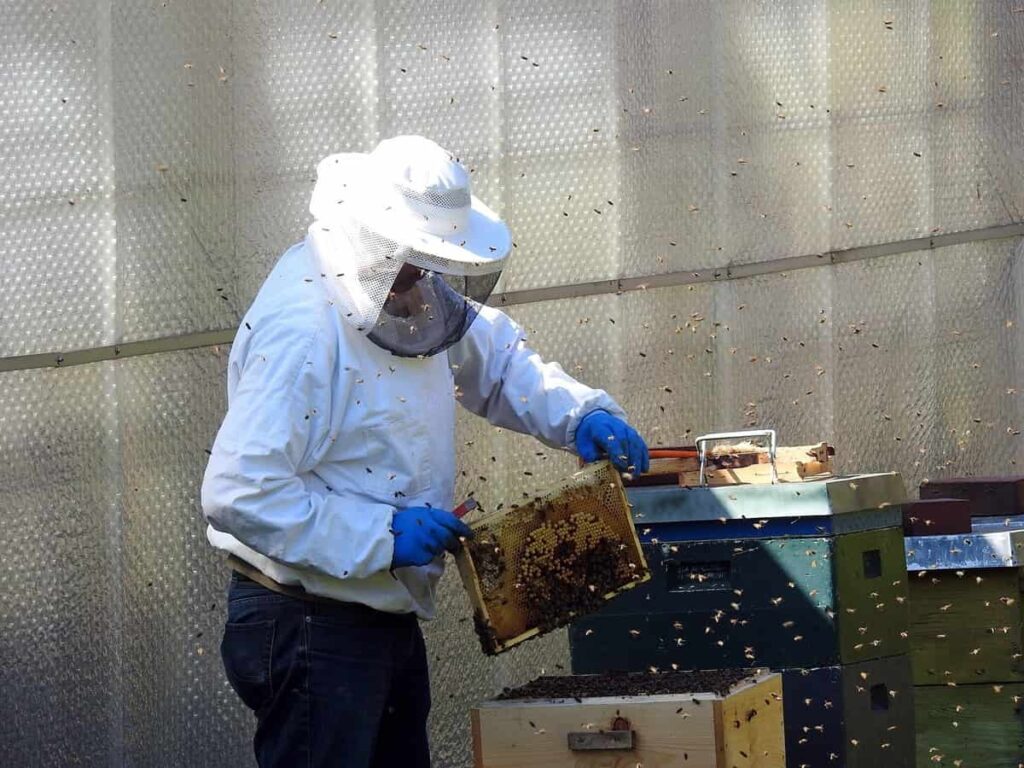
What is the current trend of contract farming in India?
In India, contract farming is a popular business model in which farmers produce crops or rear livestock according to the specifications of an agri-business firm. The company provides the farmer with inputs like seeds, fertilizer, and sometimes even livestock. Then, the farmer agrees to sell their output to the company at a predetermined price. Contract farming has become increasingly popular in India in recent years as it offers many advantages to both farmers and companies.
For farmers, it provides access to quality inputs and technical know-how to help them improve their yields. It also gives them a guaranteed market for their produce, ensuring they get a fair product price. Contract farming helps companies secure a steady supply of raw materials for their operations. It also allows them to develop closer relationships with their suppliers and build trust with the farmers they work with. Despite its many benefits, contract farming is not without its risks.
Farmers can find themselves in a position of dependence on the companies they work with, which can leave them vulnerable to exploitation. There have also been cases of companies failing to honor their agreements with farmers, leading to financial losses for the latter. Contract farming is seen as a positive development in India’s agricultural sector. It has the potential to empower smallholder farmers and help them increase their incomes while providing companies with a reliable source of raw materials.
Companies involved in contract farming of Honey Bees in India
Contract farming of honey bees is a current trend in India. This type of farming involves the rearing of honey bees by farmers under the guidance of an experienced beekeeper. The companies involved in contract farming of honey bees provide the beekeepers with hives, apiary equipment, and training. They also purchase the honey produced by the beekeepers. The cost of setting up a contract farm for honey bees varies depending on the scale of operation.
In case you missed it: Contract Fish Farming in India: Companies, Agreement, Profits, Process, Benefits, and Risks
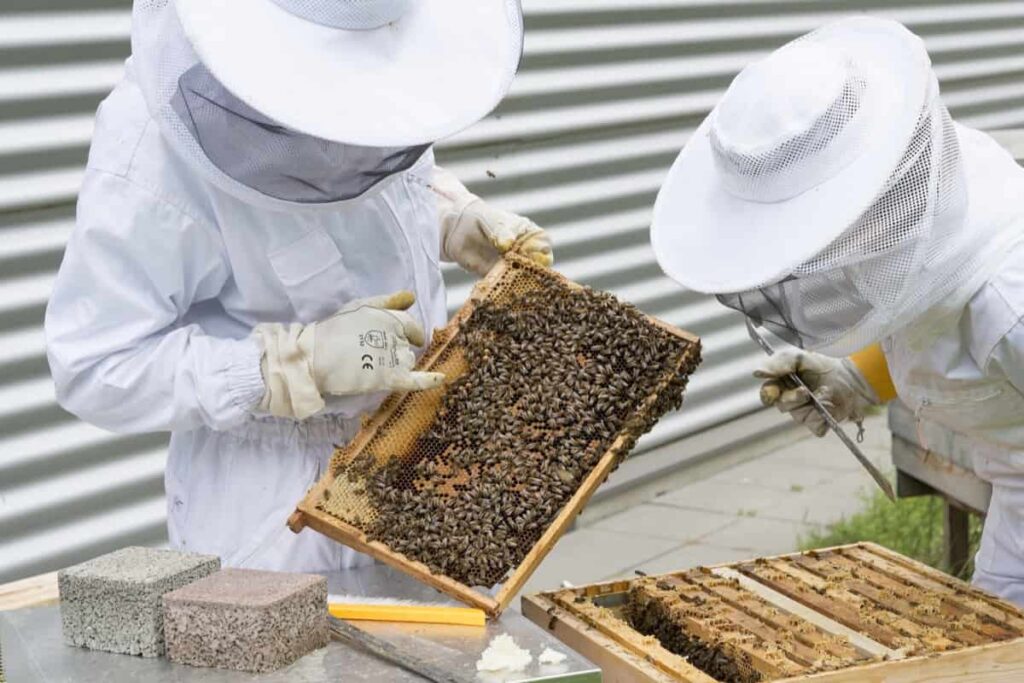
For a small-scale operation, the cost may range from Rs. 10,000 to Rs. 20,000. The cost may be between Rs. 1 lakh for a medium-scale operation to Rs 2 lakhs. Finally, for a large-scale operation, the cost could be upwards of Rs 5 lakhs. The profit margin from contract farming of honey bees depends on various factors such as yield per hive, the market price of honey, etc. Generally, the beekeepers can expect to earn a profit of Rs 10,000 to Rs 20,000 per hectare.
Under a contract farming agreement, the company provides the beekeeper with hives and apiary equipment on loan. The beekeeper is responsible for maintaining the hives and collecting honey. The company pays the beekeeper based on the quantity of honey collected. The agreement also specifies specific quality standards that the beekeeper must meet. There are pros and cons to contract farming of honey bees. Some of the advantages include the following:
Process of contract farming of Honey Bees in India
Contract Farming of Honey Bees in India is a process where farmers get bees from companies and rear them in their farms. The company provides the required infrastructure and technical support to the farmer. The farmer agrees to sell the honey produced by the bees to the company at a pre-agreed price. This system has many advantages for both the farmer and the company. The main advantage of Contract Farming of Honey Bees is that it helps in risk reduction for both the farmer and the company.
For the farmer, it reduces the risk of crop failure as they are not solely dependent on honey production. For the company, it reduces the risk of fluctuations in raw material supply as they have a contract with the farmer. Another advantage of this system is that it helps in quality control. The companies provide technical support to farmers, which helps them to maintain high standards of beekeeping. This results in better quality honey for the companies.
The cost of setting up a contract farming system is relatively low compared to other types of farming. The main cost incurred is in providing technical support to farmers. However, this cost is offset by the increased security of raw material supply and quality control benefits achieved through contract farming. Honey bee contract farming is currently gaining popularity in India as more and more farmers realize its benefits. Some major companies involved in the contract farming of honey bees include Dabur, Baidyanath, Himani Bestvcream, Zandu Pharmacy, etc.
In case you missed it: Contract Poultry Farming in India: Profits, Companies, Agreement, How it Works, The Pros and Cons.
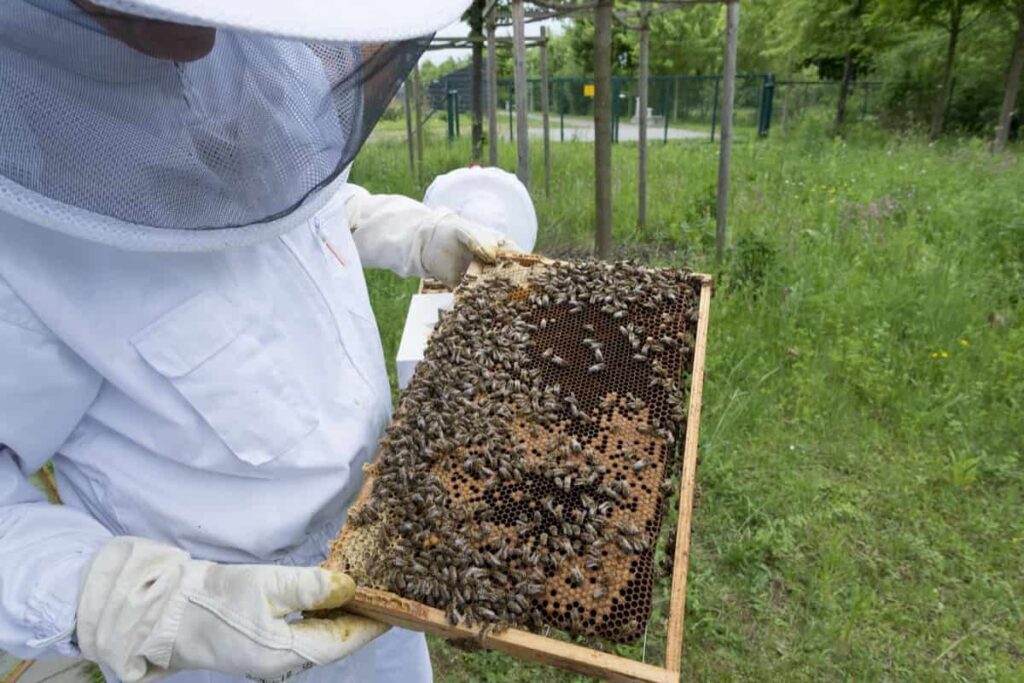
Agreement between the farmer and the company in India
The farmer and the company agreement is a contract in which the farmer agrees to provide a specified area of land for honey production and follow the company’s management practices. The company provides bees, beehives, and other necessary equipment and pays the farmer a fixed price per kilogram of honey produced. The contract period is typically three years.
The main purpose of the honey bee contract farming agreement is to ensure a steady supply of honey for the company while minimizing risk and cost for the farmer. This type of arrangement is becoming increasingly popular in India as large companies look to secure supplies of raw materials from small-scale producers. There are several benefits for farmers who enter into these agreements:
- Bee farmers are guaranteed a fixed price for their honey, which gives them some predictability and security in an otherwise volatile market.
- They have access to better-quality beekeeping equipment and resources, which can improve honey yield and quality.
- These contracts often include technical assistance from the company, which can help farmers improve their management practices.
There are also some risks associated with this type of agreement. First, if market prices for honey rise above the fixed price paid by the company, the farmer misses out on potential profits. Second, if market prices fall below the fixed price, farmers may be stuck with unsold honey or be forced to sell at a loss.
Indian government schemes for Honey bee farming/beekeeping
The Indian government has launched several schemes to promote honey bee farming and beekeeping in the country. The National Beekeeping and Honey Mission (NBHM) is one of the key initiatives under the National Mission for Sustainable Agriculture (NMSA). The NBHM aims to improve beekeeping operations’ productivity and develop a sustainable honey industry in India.
Under the NBHM, the government provides financial assistance for constructing bee boxes, purchasing beehives, and training beekeepers. The mission also supports research and development activities related to honey bees and beekeeping. In addition, the government has also launched the Pradhan Mantri Kisan Samman Nidhi (PM-KISAN) scheme to provide financial assistance to small and marginal farmers, including those involved in beekeeping.
The government of India has also taken steps to enable the environment for the growth of the honey industry in India. For instance, it has exempted honey from excise duty and reduced GST on honey from 18% to 5%. These measures are expected to boost the production and exports of honey from India.
Honey Bee farming cost in India
Honey bee farming cost in India is not very expensive. The total investment required for setting up a small-scale honey bee farm is between Rs. 15,000 to Rs. 20,000. This includes buying bee colonies, constructing beehives, and other miscellaneous expenses. The annual maintenance cost of a small-scale honey bee farm is around Rs. 5,000 to Rs. 10,000. The biggest costs associated with honey bee farming are buying bee colonies and constructing beehives.
Bee colonies can be bought from commercial beekeepers or other farmers who already have established hives. Beehives can be constructed from scratch or purchased from a beekeeping supply company. Setting up a medium-scale honey bee farm is between Rs. 30,000 and Rs. 50,000. This includes buying bee colonies, constructing beehives, and other miscellaneous expenses.
In case you missed it: Contract Pig Farming in India: Companies, Agreement, Profits, How it Works and the Pros and Cons
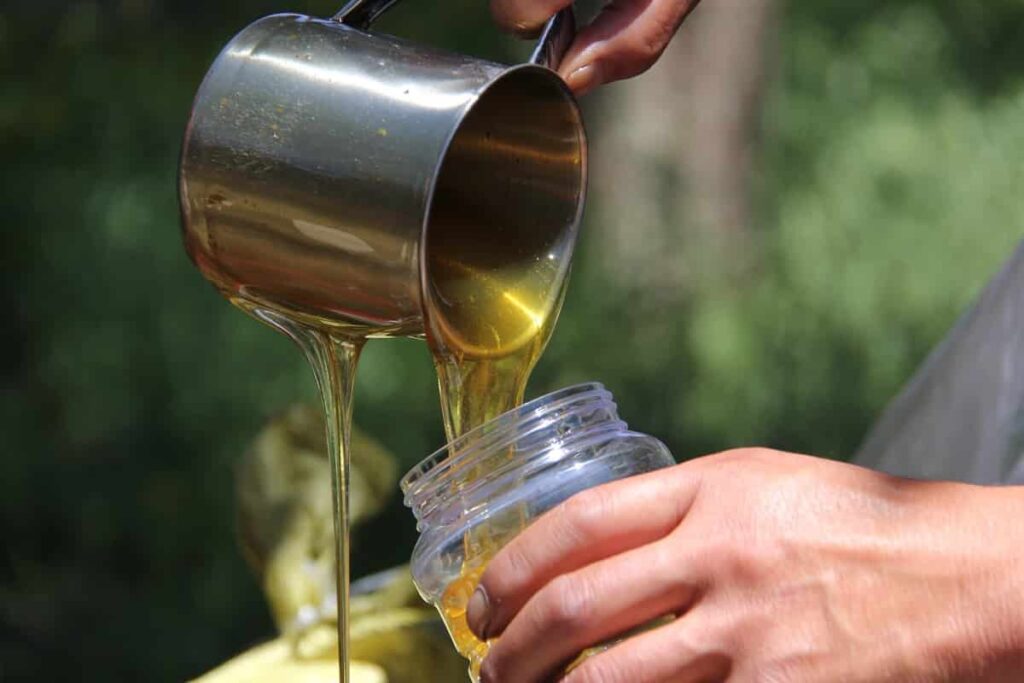
The annual maintenance cost of a medium-scale honey bee farm is around Rs. 10,000 to Rs. 20,000. Setting up a large-scale honey bee farm costs between Rs. 1 lakh to Rs. 2 lakhs. This includes buying bee colonies, constructing beehives, and other miscellaneous expenses. The annual maintenance cost of a large-scale honey bee farm is around Rs. 20,000 to Rs. 40,000. Again, the cost to set up a bee farm depends on the size of the business, and it may run from lakhs to crores.
Profits in Honey Bee contract farming in India
There is no exact answer to this because the profit in bee farming depends on many factors such as business size, farm care, business plan, and marketing strategies. The global demand for honey is constantly increasing, but the world’s supply is struggling to keep up. This has created an opportunity for honey producers in India, where the climate is ideal for bees, and the cost of production is relatively low.
As with any agricultural venture, there are risks involved in beekeeping, but with proper management, these can be minimized. One way to reduce risk is to enter into a contract with a buyer before you start producing honey. This way, you know that you will have a market for your product and can plan your production accordingly. Contract farming can be highly profitable for both the farmer and the buyer.
The farmer is guaranteed a market for their product and a fair price, while the buyer is assured a consistent supply of high-quality honey. If you are considering starting a honey bee farm in India, carefully research the market and find a reputable buyer willing to enter into a contract with you. With proper planning and management, your honey bee farm can be highly profitable and provide you with a steady income.
Business plan for Honey Bee contract farming in India
If you are thinking about starting a honey bee contract farming business, there are some things you need to know:
- You will need to have a business plan. This will help you determine the start-up costs, operating costs, and expected income.
- You will need to find a good location for your farm.
- You will need to purchase the necessary equipment and supplies.
- You will need to obtain the proper licenses and permits.
- You will need to market your business.
Starting a honey bee contract farming business can be an excellent way to earn extra income. With some planning and preparation, you can succeed in this venture.
Pros and cons of contract farming of Honey Bees in India
Honey bee contract farming is a process whereby farmers rear bees on behalf of companies purchasing honey at a predetermined price. The company provides the beehives, pays for the beeswax, and pays for any medical treatments required. The farmer manages the day-to-day care of the bees and collects the honey at regular intervals.
In case you missed it: Medicinal Plants Herbs Contract Farming in India: Profits, Companies for Tulsi, Ashwagandha, Brahmi, Aloe Vera, Shatavari, and More
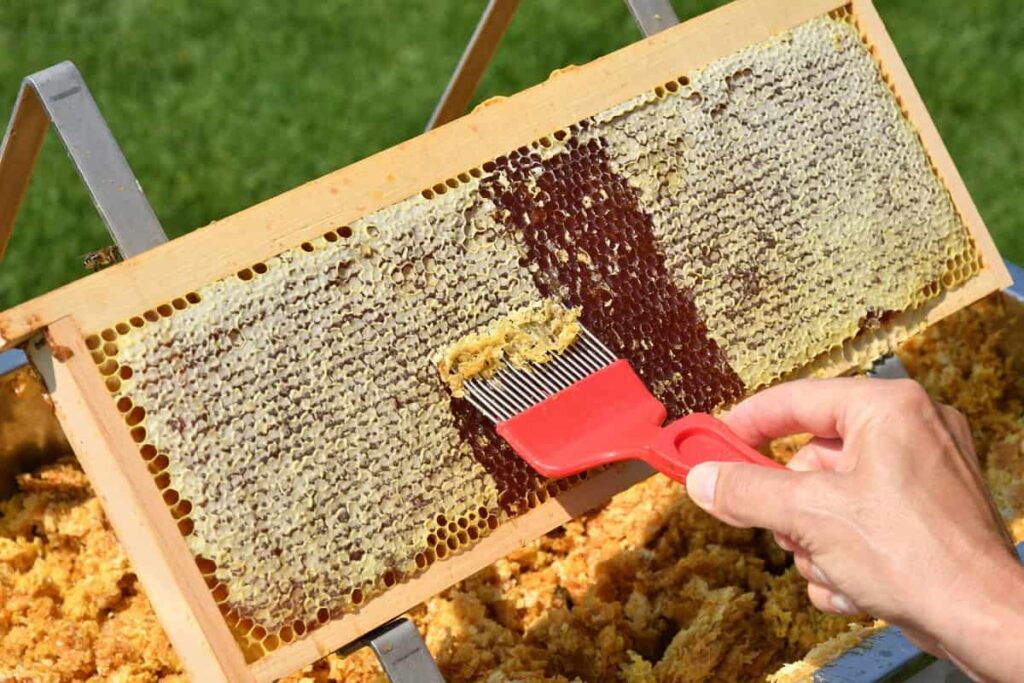
Advantages of contract farming of Honey Bees
- It is a relatively simple process with low start-up costs
- The company, not the farmer, bears the risk
- The farmer does not have to worry about marketing or selling the honey
- There is a guaranteed income for the farmer
Disadvantages of contract farming of Honey Bees
- The farmer has no control over the price or quality of the honey
- The company may terminate the agreement at any time without prior notice
- The company may change the terms of the bee farming agreement at any time without prior notice
Conclusion
Honey bee contract farming is an increasingly popular option for those interested in apiculture in India. A number of companies offer this service, and the cost is generally very reasonable. The biggest benefit of contract farming is the increased yield that can be achieved, as well as the improved quality of the honey.
However, there are some drawbacks to this type of arrangement, such as the risk of losing your bees if the company goes out of business. Overall, contract farming is an excellent option for those interested in getting into apiculture in India. If you live in the following states and plan to go for honey bee contract farming in India, this article may help you to understand the beekeeping business in India.
| Andhra Pradesh | Karnataka |
| Arunachal Pradesh | Kerala |
| Assam | Madhya Pradesh |
| Bihar | Maharashtra |
| Chhattisgarh | Manipur |
| Goa | Meghalaya |
| Gujarat | Mizoram |
| Central India | South India |
| Haryana | Sikkim |
| Himachal Pradesh | Tamil Nadu |
| Jharkhand | Telangana |
| Nagaland | Tripura |
| Odisha | Uttar Pradesh |
| Punjab | Uttarakhand |
| Rajasthan | West Bengal |
| North India | West India |
- Sheep Farming Business Plan for Beginners
- Aquaponic Farming at Home: A Step-By-Step Guide
- Profitable Village Farming Business Ideas in 2024
- High-Yield Aquaculture: Fast-Growing Fish for Farming
- Effective Fish Pond Construction Techniques for Beginners
- Irrigation and Water Management in Pineapple Farming
- Blossom to Harvest: Mastering Flowering and Pollination in Papaya Farming
- Pig Fattening Essentials: From Selection to Sale for Beginners
- Raising Wagyu Cattle: A Complete Guide for Premium Beef Production
- Soil Types and Their Water Holding Capacity
- Optimizing Irrigation Schedules for Coconut Groves for Enhanced Yield
- Espresso Your Garden: Coffee Grounds for Healthier Acid-Loving Plants
- The Best Soil Mix for Snake Plants: How to Mix Your Own Snake Plant Soil
- Green Thumb Success: Expert Tips for Cultivating Greenhouse Beans All Year Round
- Bloom All Year Round: The Ultimate Guide to Indoor Hyacinth Care
- Eco-Friendly Gardening: How to Make Liquid Fertilizer from Kitchen Waste
- Ultimate Guide to Grow Anise in Pots: Explore Seed Propagation to Harvesting
- Guide to Raising Chester White Pigs: Discover Breed Facts to Growth Management
- Mastering the Elegance: The Ultimate Guide to Weeping Cherry Tree Care, Planting, and Maintenance
- Ultimate Guide to Planting Garlic in Grow Bags: Growing Strategies for Beginners
- How to Fix Spider Plant Leaf-Related Problems: Natural and Organic Remedies
- 10 Reasons Why Your Tulsi Plant is Shedding Leaves: Home Remedies and Solutions
- Optimizing Growth and Yield: The Advantages of Palm Bunch Ash Fertilizer
- Utilizing Neem Oil Extract as a Natural Pesticide for Hydrangea
- From Soil to Harvest: Various Ways in Which Farmers Can Use AI Tools
- Steps to Encourage and Induce Citrus Flowers: A Comprehensive Guide
- How to Fix Snake Plant Leaf-Related Issues: Natural and Organic Remedies
- Transform Your Garden into a Fragrant Oasis with Raat Ki Rani (Night Blooming Jasmine)
- Discover the Ideal Chicken Breeds for Philippine Farms
- How to Create a Poultry Egg Farm Business Plan for Profits
- Grow Lemon Cucumbers Like a Pro: Insider Techniques for Bountiful Yields
- Ultimate Guide to Caring for Your Pink Princess Philodendron: Tips for Thriving Variegation
- Areca Nut Profit Per Acre: Calculating Yield and Cost of Cultivation
- How Kaveri Chicken is Becoming a More Profitable Breed in Indian Backyards
- Transform Your Barn: 9 Steps to Convert a Horse Stall into a Chicken Coop
- Exploring Suffolk Sheep Disadvantages with Limitations and Challenges
